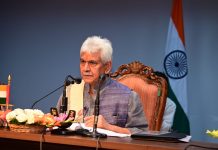 Mystery surrounds over Uttar Pradesh government’s sudden move to transfer the investigation of a matter relating to alleged scam of fudging television rating points (TRPs) to Central Bureau of Investigation (CBI) within a few hours of its registration in Hazratganj police station of state capital, Lucknow, against unknown persons for conspiracy of unlawfully earning advertisement revenue fraudulently.
Mystery surrounds over Uttar Pradesh government’s sudden move to transfer the investigation of a matter relating to alleged scam of fudging television rating points (TRPs) to Central Bureau of Investigation (CBI) within a few hours of its registration in Hazratganj police station of state capital, Lucknow, against unknown persons for conspiracy of unlawfully earning advertisement revenue fraudulently.
Controversy erupted behind the decision as Supreme Court refused to entertain such plea raised by Republic TV channel by showing him the doors of Bombay High Court, which refused its prayers of quashing FIR registered in Mumbai and staying investigation consequent thereto and ordering a CBI probe.
The High Court did not concede the demand of interim protection of arrest of its chief Arnab Goswami because as of now he has not been named as an accused in the TRP scam. However, the indirect move of the Yogi Adityanath government in registering and transferring the investigation to CBI is just look alike coping exercise of Bihar pattern shown in Sushant Singh Rajput case. It is puzzling political circles that what provoked Yogi Adityanath government to foresee political dividend behind this move.
The sudden development noticed on October 17 when a man no one had ever heard of till then, approached Lucknow’s Hazratganj police station with a complaint accusing unnamed channels of indulging in bribery to raise their TRP ratings. The complainant, Kamal Sharma, described himself as director of a lesser-known advertising company, Golden Rabbit Communications Pvt Ltd. His complaint disclosed allegations against unknown persons who committed cheating, forgery and breach of trust that he gathered from his friends in advertising and ‘open sources’. In his complaint, Sharma implicated the Broadcast Audience Research Council (BARC) into the ambit of investigation because it is responsible for the rating. “I want the probe agency should look into their role and function. A thorough investigation should be done if there is any culpability at their end,” Sharma told media in Delhi. CBI has also recorded his statement and initiated its investigations into TRP fudging case.
Interestingly, the alleged fake TRP scam came to light when the BARC filed a complaint to the Mumbai police through Hansa Research Group, alleging that certain channels were rigging TRP numbers to lure advertisers. Sharma’s complaint is by and large repetition of the same rhetoric that Arnab Goswami pleaded in his defence and asking for a CBI probe.
In retaliation to UP CM Yogi Adityanath’s surprising interference into an ongoing investigation of crime of the other state through involvement of federal government compelled the Uddhav Thackeray-led government in Maharashtra to withdraw its blanket general consent under Section 6 of the DSPE Act, 1946, available to the Central Bureau of Investigation for probing in the state without any hindrance. This move further added fuel to simmering fire for a fresh round of confrontation with the BJP.
The Maharashtra government swung into action hours after the CBI filed a case to investigate the ratings scam on the basis of a complaint filed in BJP-ruled Uttar Pradesh. The Mumbai police is currently investigating case relating to fudging TRP ratings for unlawful gains from the advertisers had accused three channels, including Republic TV channel. The Republic TV has denied any wrongdoing but the Mumbai police blame it otherwise based on recorded statements of some of the arrested accused.
The political observers feel that the way ruling BJP governments are using federal controlled premier investigation agency allegedly for safeguarding and strengthening its political interests has virtually lowered down its credibility in public eyes. Even courts, including the apex court, had sarcastically called it ‘A Caged Parrot’ while criticising its influenced and compromised functioning. The opposition ruled Rajasthan, Chhattisgarh, Punjab, West Bengal, Mizoram and Tripura governments had already withdrawn their blanket general consent accorded under Section 6 of the DSPE Act, 1946 to CBI thereby, effectively shutting the gates to the CBI in their states.
The criminal justice system equipped the police under the state governments to have investigating powers of any crime occur in its territory. The creation of federal agency under pre-constitution legislation in 1946 known as The Delhi Special Police Establishment (DSPE Act 1946)to investigate cases of corruption against the central public servants working in their respective state and union territories. However, the Gauhati High Court in 2013 had struck downed the notification of its creation holding it unconstitutional but apex court stayed it. In other words, the states can veto whether the CBI can function in their territories against public servants of central government. As a result, this arrangement has been working with many hiccups but it appears that undue interference of political maneuverings has eroded credibility and faith in the arrangement.
Analysing the outcome of such withdrawal of sanctions by the states, the former acting chief of the CBI, M. Nageswara Rao, opined in his recent article published in Swarajya, “As a result, the CBI cannot investigate cases of corruption against central public servants, working within the territories of these states. Thus, those central public servants get an informal legal immunity from being investigated and prosecuted for offences under the Prevention of Corruption Act, 1988 etc.” The emerging atmosphere of mistrust against the CBI among the non-BJP-ruled state could possess conflicting proposition of law after withdrawal of consent. Interestingly, Lokpal and Lokayukts Act 2013 and Central Vigilance Commission Act 2003 have specific powers under Section 20 and Section 8 to direct CBI to conduct an inquiry or investigation against a central public servant posted in the territories of states. So what will happen in those states where they have withdrawn consent under Section 6 of the DSPE Act, 1946?
Legal experts have diverse views if such a situation crops up. Most of the worried CBI officers feel, “If the functioning anti-corruption law enforcement mechanism within the government of India could be dependent on the consent of the states, it would make a mockery of India signing the U.N. Convention against Corruption.” It is, therefore, imperative that the Parliament enacts a new law or amend the pre-existing DSPE Act 1946, suitably to give effect to the recommendations accepted in the convention.
On the contrary, the very existence of premier investigation agency hung in uncertainty over a long pending legal dispute relating to constitutional challenge to its creation by an executive resolution of April 1, 1963, and allowing it to function like a police force equipped with powers without any legislative sanctions. The CBI had lost in the Gauhati High Court years back in 2013 and it is continuing its functions on the strength of expert interim orders of the apex court passed at the residence of the then CJI on urgent mentioning.
The division bench of the Gauhati High Court had struck down an Executive Order/Resolution No. 4/31/61-T, dated 01-04-1963, of the Ministry of Home Affairs, Government of India whereby CBI was created. The Court found its creation without any supporting statue or constitutional mandate. However, the fate of the organisation depends on outcome of its appeal before the apex court.
The Gauhati High Court delivered its judgement after it examined the constitutional challenge with regard to creation and functioning of CBI with powers of police force and considered following propositions:
Whether ‘Central Bureau of Investigation’, popularly called CBI, is a constitutionally valid police force empowered to ‘investigate’ crimes? Could a ‘police force’, empowered to ‘investigate’ crimes, have been created and constituted by a mere Resolution of Ministry of home affairs, Government of India, in purported exercise of its executive powers?
Could a ‘police force’, constituted by a Home Ministry Resolution, arrest a person accused of committing an offence, conduct search and seizure, submit charge-sheet and/or prosecute alleged offender? Whether CBI is a ‘police force’ constituted under the Union’s Legislative powers conferred by List I Entry 8?
Do Entry 1 and 2 of the Concurrent List empower the Union Government to raise a ‘police force’ and that, too, by way of Executiveinstructions of Union Home Ministry? Whether Delhi Special Police Establishment Act, 1946, empowers the Union Home Ministry to establish a ‘police force’ in the name of CBI?
(vii) Above all, is it permissible for the Executive to create a ‘police force’with power to ‘investigate’ crimes in exercise of its executive powers, when exercise of such a power adversely affects or infringes fundamental rights embodied in Part III of the Constitution, particularly, Article 21?
The bench comprising the chief justice I.A. Ansari and justice Indira Shah quashed the notification of creation of CBI and held that the CBI is neither an organ nor a part of the DSPE Act 1946and the CBI cannot be treated as a ‘police force’ constitute dunder the DSPE Act. The appeal is pending in the apex court without proper hearing since 2013 on its merit resulting in dilution of its authority, uncertainty among its functionaries and above all vulnerability before political power due to organisational adhocism.
letters@tehelka.com











